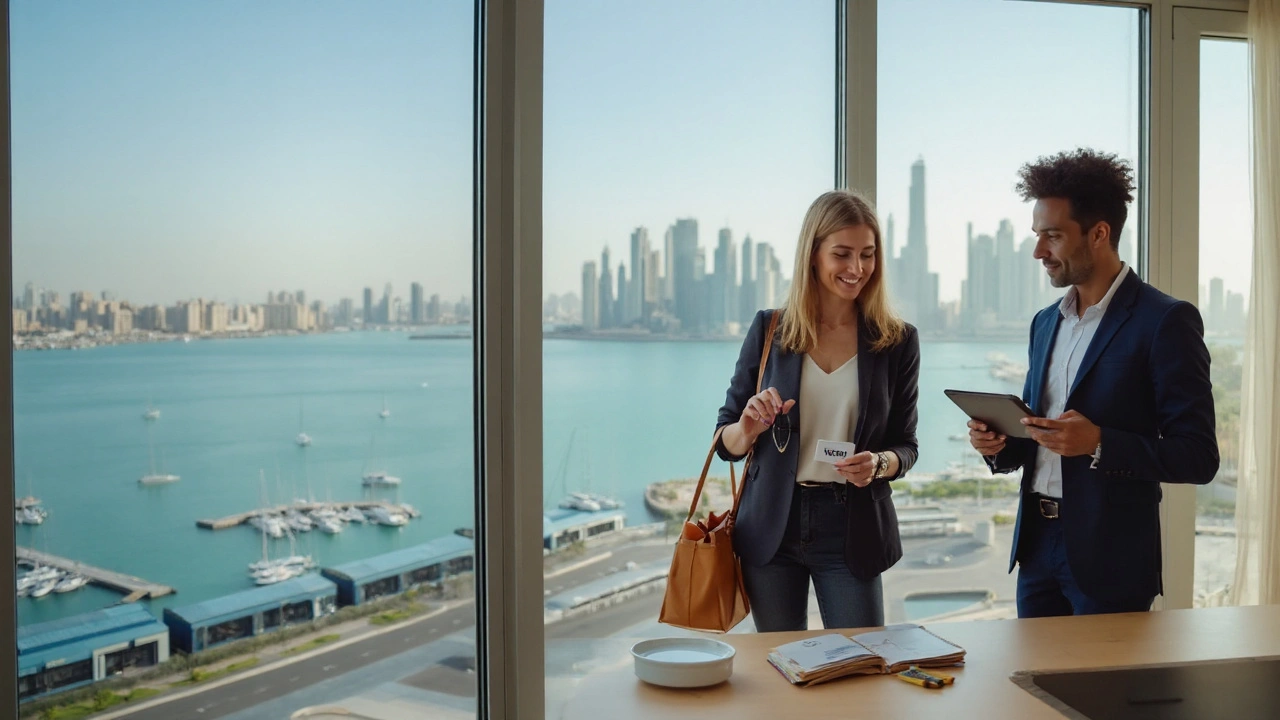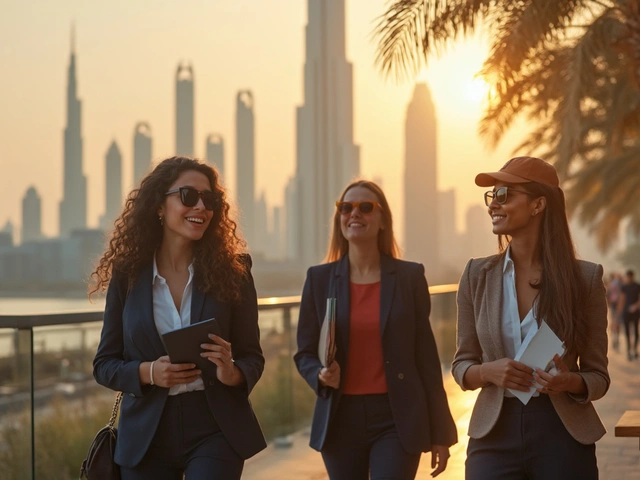
You came here for straight answers. What’s it really like for European girls in Dubai-for a long weekend, a six-month stint, or a full move? Here’s the short version: Dubai is friendly, extremely safe by global city standards, and built for convenience. You’ll love the sunshine, service, and career pace. But the rules matter. Dress codes are context-based, alcohol is regulated, social media is not a free-for-all, and visas shape what you can and can’t do. This guide gives you the real-life playbook: laws with teeth, costs you’ll actually pay, where to live, how the job hunt works, and how to build a social life without stepping on landmines.
TL;DR: Key takeaways and quick wins
- Dubai is safe, clean, and efficient. You can live beach-to-boardroom easily, but respect local laws (public decency, alcohol, social media) and you’ll be fine.
- Dress modestly in malls/government buildings; beachwear is for beaches and pools. PDA is low-key. No drunk-in-public or street drinking.
- Costs vary by area: Dubai Marina/JBR and Downtown/Business Bay are popular with Europeans but pricier. Think in AED and watch annual rent terms.
- Most European passports get visa-on-arrival for short stays (check the UAE ICP by nationality). Work requires employer sponsorship or a freelancer permit/residence.
- Dating is mainstream via apps, but keep it discreet and lawful. Nightlife is lively, licensed, and pricey; taxis are the default ride home.
Culture and law basics: the rules that actually affect your day
Dubai is cosmopolitan, but it’s still the UAE. The spirit is “enjoy yourself, be respectful, follow the rules.” Most trouble starts when visitors assume the city works like home. It doesn’t-and that’s okay. Here’s the distilled version that keeps you in safe territory.
- Dress code: You’ll see crop tops and minidresses in nightlife areas, but play it modest in malls, government buildings, and family spaces. Shoulders and knees covered is a good default. Swimwear stays on beaches and at hotel pools.
- PDA: A quick hug or hand-hold won’t raise eyebrows, but extended PDA can. Keep it low-key.
- Alcohol: Legal for 21+. Drink only in licensed venues (hotels, restaurants, clubs) and licensed shops. No street drinking. Avoid being drunk in public. Carry ID. Tourists can usually buy from licensed shops with a passport; residents follow emirate-specific rules. When in doubt, licensed venues are your safe zone.
- Drugs and meds: Zero tolerance on narcotics and recreational drugs-even tiny amounts. Some prescription meds require documentation or are restricted. If you bring medication, carry a prescription and keep it in original packaging. Check the UAE health authority list before you fly.
- Social media and speech: UAE cybercrime laws are strict. Don’t post about accidents, sensitive sites, or other people without consent. Avoid insults, defamation, or “naming and shaming.” A rant that’s normal in London can be a legal headache in Dubai.
- Photos: Don’t photograph people without permission, especially families and security personnel. When in doubt, ask or skip the shot.
- Relationships: Unmarried cohabitation was decriminalised in recent legal reforms, and most hotels welcome unmarried couples. Still, keep it discreet and respectful in public spaces.
- Ramadan: During fasting hours, avoid eating, drinking, or smoking in public. Hotels and many restaurants serve behind screens; you can eat there. Dress a notch more modestly, and nightlife is quieter until after sunset.
For legal clarity, check primary sources: UAE Public Prosecution announcements for decency and cybercrime updates; the UAE Federal Authority for Identity, Citizenship, Customs & Port Security (ICP) for visas; and Dubai’s Department of Economy and Tourism for visitor guidance. Laws do change-especially since the 2020-2023 reforms-so verify close to your travel date.
Money, neighbourhoods, and getting around: what it costs and where it’s easy
Dubai can be spendy or sensible. Pick the right neighbourhood, understand how rent works, and you’ll avoid cash burn. Expect rent to be quoted annually, often paid in 1-4 cheques. If you’re used to monthly rent, this feels intense; many employers offer housing allowances or salary advances to cover upfront costs.
Neighbourhoods Europeans actually live in:
- Dubai Marina/JBR: Beach access, water views, buzzing promenade. Busy on weekends. Great for first-timers, higher rent.
- JLT (Jumeirah Lakes Towers): Across from Marina, more budget-friendly, loads of cafés and studios for remote work.
- Downtown/Business Bay: Near Burj Khalifa/Dubai Mall, central and chic, quick to DIFC. Traffic can bite.
- DIFC: Smart, walkable business/restaurant cluster. Convenience costs more; apartments are slick.
- Jumeirah/UM Suqeim: Villa vibes, calmer, more family-centric, beach nearby, fewer towers.
Rule of thumb: If you’ll work in DIFC/Downtown, live Downtown/Business Bay to skip massive commutes. If you want sea and social, Marina/JBR or JLT. If you crave quiet, look at Jumeirah or parts of the Palm (budget allowing).
Typical 2025 monthly costs (solo, mid-range lifestyle):
| Item | Low (AED) | Mid (AED) | High (AED) | Notes |
|---|---|---|---|---|
| Rent (1-bed, Marina/JLT) | 6,500 | 9,000 | 13,000 | Quoted annually; many pay in 1-4 cheques |
| Utilities (DEWA: power/water) | 350 | 600 | 900 | AC drives summer bills |
| Mobile plan | 100 | 160 | 250 | 5G is standard; eSIMs are easy |
| Groceries | 1,000 | 1,500 | 2,200 | Imported goods bump the bill |
| Gym/fitness | 200 | 350 | 700 | Studios are pricier than big-box gyms |
| Cafés/dining out | 600 | 1,200 | 2,000 | Brunches and bars add up quickly |
| Transport (mix of metro/taxi) | 200 | 500 | 900 | Metro is cheap; taxis convenient |
| Alcohol/nightlife | 0 | 600 | 2,000 | Beers ~45-60 AED; cocktails ~60-90 AED |
Transport tips:
- Metro: Clean, safe, cheap (think 3-8 AED per ride depending on zones). There’s a women-and-children carriage if you prefer it at peak times.
- Taxis/Careem/Uber: Everywhere, metered, reliable. If a driver suggests cash without meter, request meter or rebook. Keep location sharing on when heading home late.
- Driving: Many European licences convert to a UAE licence once you have residency-check Dubai’s Roads and Transport Authority (RTA) accepted-country list. Fuel is cheaper than most of Europe; parking varies by area.
- Heat plan: From May to September, limit long walks midday. AC is life. Keep water on you and wear SPF 50+ all year.
Budget heuristics that work: cap rent at 30-35% of your net income; expect your first month to be 2-3x normal with deposits, agency fees (~5%), and furnishing. Build a 3-month cushion if you’re arriving without an employer package.

Visas, jobs, and paperwork: how to stay legal and get paid
Short stays are easy; work is regulated. The UAE runs on residence visas tied to sponsors (employer, free zone, or family). Here’s the practical snapshot-verify the details for your passport on the UAE ICP portal or with your employer’s PRO (public relations officer).
- Tourist/visit entry: Many European passports get visa-on-arrival for short stays (duration varies by nationality). Your passport must have blank pages and a minimum validity (usually 6 months). You cannot legally work on a tourist visa.
- Employment visa: Your employer sponsors your residence visa and work permit via MOHRE (Ministry of Human Resources and Emiratisation) or the relevant free zone authority. You’ll complete a medical test, Emirates ID biometrics, and then get your residence sticker/eVisa.
- Freelancer/independent permits: Dubai has free-zone options (e.g., media, tech, education) that issue a permit and, in many cases, a residence visa. Expect fees for the permit, establishment card, and visa-often several thousand AED per year. Good for remote workers and consultants.
- Remote work programme: Dubai’s remote work visa has existed in various forms since 2020. It allows you to live in Dubai while employed by a non-UAE company, subject to income and insurance requirements. Check current terms before applying.
- Golden/Green visas: For high earners, investors, exceptional talent, or specialised professionals. If you qualify, it’s flexible and longer-term (5-10 years). Documentation standards are high.
The hiring rhythm: Most interviews are fast, offers are written, and onboarding is paperwork-heavy but predictable. Salaries are tax-free in the UAE, but check UK/EU tax residency rules if you’re moving long-term. Standard packages may include housing allowance, health insurance, annual flight allowance, and schooling (if applicable). Negotiate relocation support if rent is due upfront in one cheque.
Typical monthly salary bands (very rough, 2025 market ranges, AED):
- Marketing/PR mid-level: 12,000-22,000
- Hospitality management: 10,000-18,000
- Finance analyst/associate: 16,000-30,000
- Product/tech roles: 20,000-45,000
- Executive assistant: 12,000-20,000
Paperwork checklist after you get an offer:
- Offer letter + contract (read for probation, notice, end-of-service benefits).
- Entry permit arranged by employer (if you’re outside the UAE) or status change if you’re inside.
- Medical test + Emirates ID biometrics (carry originals and copies of your passport, photos, and insurance).
- Residence visa issuance, bank account opening, mobile plan, and tenancy contract (Ejari) if renting in Dubai.
Authoritative sources to know by name: MOHRE (work permits and labour rights), ICP (visas and residence), DHA/DOH (health requirements), RTA (driving licence conversion), and the relevant free zone authority if you go the freelancer route.
Social life, dating, and safety: how to build a circle and avoid drama
Dubai is full of new arrivals, which makes it oddly easy to make friends. People tend to be open to plans, brunches, and last-minute nights out. The trick is knowing where to look and how to move safely.
Meeting people that stick:
- Gyms and studios: Classes at boutique studios (HIIT, reformer Pilates, boxing) are social glue. Pick one near your home and go regularly.
- Co-working cafés: JLT and Business Bay have laptop-friendly cafés with a remote worker crowd. Go at similar times and chat at the counter.
- Clubs and communities: Join women’s groups, sports clubs (padel is huge), and language swaps. Volunteer events pop up around Expo City and community centres.
- Professional networks: DIFC events, industry breakfasts, and free-zone mixers. Go once; you’ll leave with three WhatsApp groups.
Nightlife and dating basics:
- Licensed venues are your friend: Hotel bars, beach clubs, and lounges run ladies’ nights and brunch deals. Keep your ID on you.
- Dating apps: Common and widely used. Be discreet in bios, and don’t share private photos or someone else’s images-UAE cybercrime and privacy laws are strict.
- First meet-ups: Choose public places. Share your live location with a friend. Use licensed taxis home.
- Consent and respect: Clear communication matters. Keep PDA minimal in public spaces and be mindful around families.
Street smarts that work in Dubai:
- Use women-and-children metro carriages if a carriage feels crowded; it’s comfortable at rush hour.
- Emergency numbers to know: 999 (police), 998 (ambulance), 997 (fire). Save them.
- Avoid at all times: illegal substances, vaping where prohibited, drunk-in-public, aggressive driving, and social media call-outs.
- Heat management: Hydrate early, reapply SPF, and plan outdoor workouts near sunrise.
Safety note: Dubai’s reported crime rates are low and the city is heavily surveilled. You’ll see women walking home late in Marina or Downtown. Keep the usual big-city awareness and you’ll feel the difference quickly.
Packing for success:
- Clothes that layer: light dresses, a linen shirt, a modest wrap for malls or Ramadan, and breathable gym gear.
- Sandals and sneakers you can actually walk in. Pavements heat up; cheap soles melt.
- Travel-size SPF and a refillable water bottle (many gyms and offices have dispensers).
- Printed copies of key documents for onboarding days-yes, paper still helps.
Checklists, mini‑FAQ, and next steps
Two ready-to-use checklists-one for a short trip, one for a move-plus quick answers to questions that pop up after you book the flight.
Weekend or short-stay checklist:
- Passport validity (6 months) and entry status for your nationality checked on the ICP site.
- Travel insurance that covers heat exhaustion and high temperatures.
- Outfits: beachwear for pools/beaches, modest outfits for malls and government buildings.
- Reservations: dinner and beach club bookings (walk-ins can be tough on weekends).
- Cards and cash: Cards accepted almost everywhere; keep small cash for taxis or tips.
Moving checklist (first 30 days):
- Offer letter and visa process timeline in writing; confirm who pays fees.
- Temporary accommodation for 2-4 weeks to flat-hunt in person.
- Bank account appointment, mobile plan, and Emirates ID biometrics calendar invites blocked.
- Rent plan: budget for deposit (usually 5% of annual rent), agency fee (~5%), Ejari fee, and DEWA setup.
- Health insurance card details in hand before your medical test.
- Driving licence conversion documents (if eligible) or plan for metro/taxi.
Mini‑FAQ
- Is Dubai safe for solo European women? Yes. It’s one of the safest big cities for women walking alone at night. Still use basic precautions.
- What can I wear? Beachwear at the beach/pool; modest outfits in malls/government spaces. Nightlife is more relaxed, but carry a light cover-up.
- Can I drink alcohol? Yes, at licensed venues and shops. No street drinking. Keep your ID on you. Don’t drive after even one drink.
- Can I work on a tourist visa? No. You need employer sponsorship, a freelancer permit, or an appropriate residence visa.
- Are unmarried couples allowed in hotels or apartments? Yes, after recent legal reforms. Keep public behaviour respectful.
- Are tattoos okay? Yes, but keep them covered in formal or conservative settings if you want zero attention.
- What about Ramadan? You can eat in designated places during the day. Dress slightly more modestly; nightlife shifts later.
Next steps by scenario
- Solo city-break: Pick a hotel in Marina or Downtown for walkability. Book two restaurants, one beach club, a desert trip, and a spa afternoon.
- Remote worker test-run (30-60 days): Rent a serviced apartment in JLT or Business Bay, buy a monthly metro pass, and trial two co-working spots.
- New job onboarding: Ask HR for a visa timeline, relocation funds for rent cheques, and temporary housing. Set up your bank and phone in week one.
- Career climber: Aim for DIFC/Downtown. Block one networking event per week and a mentor coffee every fortnight.
Quick risk mitigations
- Legal: Save the ICP, MOHRE, and RTA portals. Screenshot your entry stamp/eVisa.
- Financial: Keep a 3‑month buffer. Avoid apartments that demand more than 4 cheques unless the price is truly worth it.
- Health: Schedule AC‑friendly workouts and buy electrolyte tabs. Heat is real.
- Digital: Two phones or an eSIM helps separate work, dating, and banking. Lock down your social media privacy settings.
Dubai rewards people who plan and play by the rules. If you want sun before breakfast, a clean commute, and a calendar full of invites by week two, it’s your city. Be respectful, be prepared, and you’ll slot right in.


